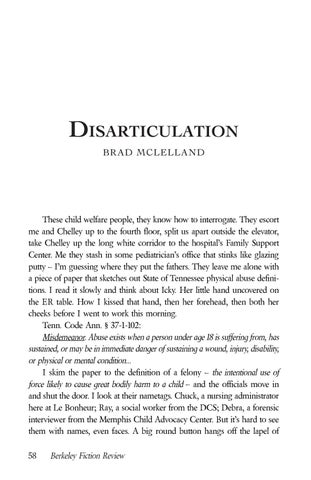disarticulation BRAD MCLELLAND
These child welfare people, they know how to interrogate. They escort me and Chelley up to the fourth floor, split us apart outside the elevator, take Chelley up the long white corridor to the hospital’s Family Support Center. Me they stash in some pediatrician’s office that stinks like glazing putty – I’m guessing where they put the fathers. They leave me alone with a piece of paper that sketches out State of Tennessee physical abuse definitions. I read it slowly and think about Icky. Her little hand uncovered on the ER table. How I kissed that hand, then her forehead, then both her cheeks before I went to work this morning. Tenn. Code Ann. § 37-1-102: Misdemeanor. Abuse exists when a person under age 18 is suffering from, has sustained, or may be in immediate danger of sustaining a wound, injury, disability, or physical or mental condition... I skim the paper to the definition of a felony – the intentional use of force likely to cause great bodily harm to a child – and the officials move in and shut the door. I look at their nametags. Chuck, a nursing administrator here at Le Bonheur; Ray, a social worker from the DCS; Debra, a forensic interviewer from the Memphis Child Advocacy Center. But it’s hard to see them with names, even faces. A big round button hangs off the lapel of 58
Berkeley Fiction Review

